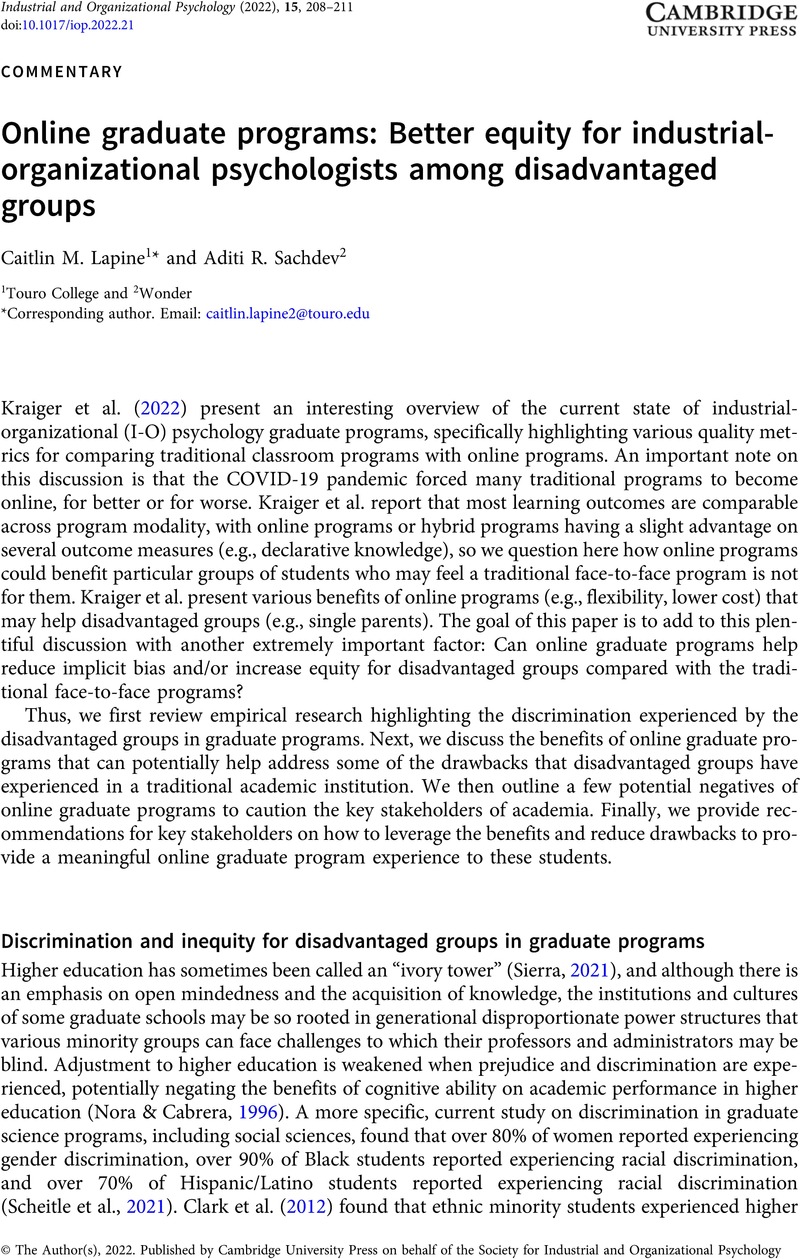No CrossRef data available.
Article contents
Online graduate programs: Better equity for industrial-organizational psychologists among disadvantaged groups
Published online by Cambridge University Press: 26 May 2022
Abstract
An abstract is not available for this content so a preview has been provided. Please use the Get access link above for information on how to access this content.

- Type
- Commentaries
- Information
- Copyright
- © The Author(s), 2022. Published by Cambridge University Press on behalf of the Society for Industrial and Organizational Psychology
References
Clark, C. R., Mercer, S. H., Zeigler-Hill, V., & Dufrene, B. A. (2012). Barriers to the success of ethnic minority students in school psychology graduate programs. School Psychology Review, 41(2), 176–192.CrossRefGoogle Scholar
Dugan, J. P., Kusel, M. L., & Simounet, D. M. (2012). Transgender college students: An exploratory study of perceptions, engagement, and educational outcomes. Journal of College Student Development, 53(5), 719–736.CrossRefGoogle Scholar
Future Forum (2021, October). The great executive-employee disconnect: Study of global knowledge workers shows the view of the office looks different from the top. Slack. https://futureforum.com/wp-content/uploads/2021/10/Future-Forum-Pulse-Report-October-2021.pdf
Google Scholar
Kraiger, K., Fisher, S., Grossman, R., Mills, M. J., & Sitzmann, T. (2022). Online I-O graduate education: Where are we and where should we go? Industrial and Organizational Psychology: Perspectives on Science and Practice, 15(2), 151–171.Google Scholar
Miller, A. N., & Orsillo, S. M. (2020). Values, acceptance, and belongingness in graduate school: Perspectives from underrepresented minority students. Journal of Contextual Behavioral Science, 15, 197–206.CrossRefGoogle Scholar
Nora, A., & Cabrera, A., F. (1996). The role of perceptions of prejudice and discrimination on the adjustment of minority students to college. Journal of Higher Education, 67(2), 119–148.CrossRefGoogle Scholar
Quinton, W. J. (2019). Unwelcome on campus? Predictors of prejudice against international students. Journal of Diversity in Higher Education, 12(2), 156–169.CrossRefGoogle Scholar
Rosenthal, M. N., Smidt, A. M., & Freyd, J. J. (2016). Still second class: Sexual harassment of graduate students. Psychology of Women Quarterly, 40(3), 364–377.CrossRefGoogle Scholar
Salvo, S., Shelton, K., & Welch, B. (2017). African American males and online education: A review of the literature. Online Journal of Distance Learning Administration, 20(4), 1–20.Google Scholar
Sierra, H. (2021, April 30). The ivory tower of academia: Higher education lacks racial, ethnic and economic diversity. Baltimore Sun. https://www.baltimoresun.com/opinion/op-ed/bs-ed-op-0502-academia-ivory-tower-race-20210430-nrzxi3sa75af3bwhyyyxnavvqi-story.html
Google Scholar
Scheitle, C. P., Remsburg, T., & Platt, L. F. (2021). Science graduate students’ reports of discrimination due to gender, race, and religion: Identifying shared and unique predictors. Socius: Sociological Research for a Dynamic World, 7. https://doi.org/10.1177%2F23780231211025183
CrossRefGoogle Scholar




